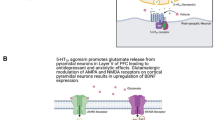Summary
Mice treated with Δ9-tetrahydrocannabinol (THC; 5 and 10mg/kg i.v.) showed the catalepsy in high bar test, and median descent latencies of catalepsy were about 150 sec. Dizocilpine (MK-801, 0.05 and 0.1mg/kg), non-competitive N-methyl-D-aspartate (NMDA) antagonist, significantly attenuated THC-induced catalepsy. Furthermore, the anticataleptic effect of MK-801 on THC-induced catalepsy was blocked by acetylcholine agonist oxotremorine (0.005 mg/kg) and dopamine antagonist haloperidol (0.01mg/kg), but not by NMDA. Oxotremorine, haloperidol, and NMDA themselves did not affect THC-induced catalepsy at the doses used. These results suggest that the anticataleptic effect of MK-801 on THC-induced catalepsy may be developed through dopaminergic and acetylcholinergic neuronal systems.
Similar content being viewed by others
References
Carlsson M, Carlsson A (1989a) The NMDA antagonist MK-801 causes marked locomotor stimulation in monoamine-depleted mice. J Neural Transm 75: 221–226
Carlsson M, Carlsson A (1989 b) Dramatic synergism between MK-801 and clonidine with respect to locomotor stimulatory effect in monoamine-depleted mice. J Neural Transm 77: 65–71
Carlsson M, Svensson A (1990) Interfering with glutamatergic neurotransmission by means of NMDA administration discloses the locomotor stimulatory potential of other transmitter systems. Pharmacol Biochem Behav 36: 45–50
Costall B, Olley JE (1971) Cholinergic- and neuroleptic-induced catalepsy: modification by lesions in the caudate-putamen. Neuropharmacology 10: 297–306
Devane WA, Dysarz FAI, Johnson MR, Meivin LS, Hewlett AC (1988) Determination and characterization of a cannabinoid receptor in the rat brain. Mol Pharmacol 34: 605–613
Fujiwara M, Sakurai Y, Kiyota Y, Shimazoe T, Ohta H, Shibata S, Ueki S (1985) Behavioral pharmacology of amantadine with special references to the effect on abnormal behavior in mice and rats. Folia Pharmacol Japon 85: 259–274 (abstract in English)
Herkenham M, Lynn AB, Little MD, Johnson MR, Melvin LS, de Costa BR, Rice KC (1990) Cannabinoid receptor localization in brain. Proc Natl Acad Sci USA 87: 1932–1936
Herkenham M, Lynn AB, de Costa BR, Richfield EK (1991) Neuronal localization of cannabinoid receptors in the basal ganglia of the brain. Brain Res 547: 267–274
Hasegawa M, Kinoshita H, Amano M, Hasegawa T, Kameyama T, Nabeshima T (1993) MK-801 increases endogenous acetylcholine release in the rat parietal cortex: a study using brain microdialysis. Neurosci Lett 150: 53–56
Hiramatsu M, Cho AK, Nabeshima T (1989) Comparison of the behavioral and biochemical effects of the NMDA receptor antagonists, MK-801 and phencyclidine. Eur J Pharmacol 166: 359–366
Liljequist S, Ossowska K, Gragowska-Anden M, Anden NE (1991) Effect of the NMDA receptor antagonist, MK-801, on locomotor activity and on the metabolism of dopamine in various brain areas in mice. Eur J Pharmacol 195: 55–61
Lupp A, Lücking CH, Kock R, Jackisch R, Feuerstein TJ (1992) Inhibitory effects of the antiparkinsonian drugs memantine and amantadine on N-methyl-D-aspartate-evoked acetylcholine release in the rabbit caudate nucleus in vitro. J Pharmacol Exp Ther 263: 717–724
Mehta AK, Ticku MK (1990) Role of N-methyl-D-aspartate (NMDA) receptors in experimental catalepsy in rats. Life Sci 46: 37–42
Olney JW, Price MT, Labruyene J, Salles KS, Friedrich G, Mueller M, Silverman E (1987) Anti-parkinsonian agents are phencyclidine agonists and N-methyl-aspartate antagonists. Eur J Pharmacol 142: 319–320
Papa SM, Engber TM, Boldry RC, Chase TN (1993) Opposite effects of NMDA and AMPA receptor blockade on catalepsy induced by dopamine receptor antagonists. Eur J Pharmacol 232: 247–253
Pertwee RG, Ross TM (1991) Drugs which stimulate or facilitate central cholinergic transmission interact synergistically with delta-9-tetrahydrocannabinol to produce marked catalepsy in mice. Neuropharmacology 30: 67–71
Rao TS, Kim HS, Lehmann J, Martin LL, Wood PL (1990) Selective activation of dopaminergic pathways in the mesocortex by compounds that act at the phencyclidine (PCP) binding site: tentative evidence for PCP recognition sites not coupled to N-methyl-D-aspartate (NMDA) receptors. Neuropharmacology 29: 225–230
Schmidt WJ, Bubser M (1989) Anticataleptic effects of the N-methyl-D-aspartate antagonist MK-801 in rats. Pharmacol Biochem Behav 32: 621–623
Sonsalla PK, Nicklas WJ, Heikkila RE (1989) Role for excitatory amino acids in meth-amphetamine-induced nigrostriatal dopaminergic toxicity. Science 243: 398–400
Ueki S (1980) Abnormal behavior induced by Δ9-tetrahydrocannabinol and its pharmacological characteristics. Trends Pharmacol 1: 126–129
Author information
Authors and Affiliations
Rights and permissions
About this article
Cite this article
Kinoshita, H., Hasegawa, T., Katsumata, Y. et al. Effect of dizocilpine (MK-801) on the catalepsy induced by Δ9-tetrahydrocannabinol in mice. J. Neural Transmission 95, 137–143 (1994). https://doi.org/10.1007/BF01276432
Received:
Accepted:
Issue Date:
DOI: https://doi.org/10.1007/BF01276432




